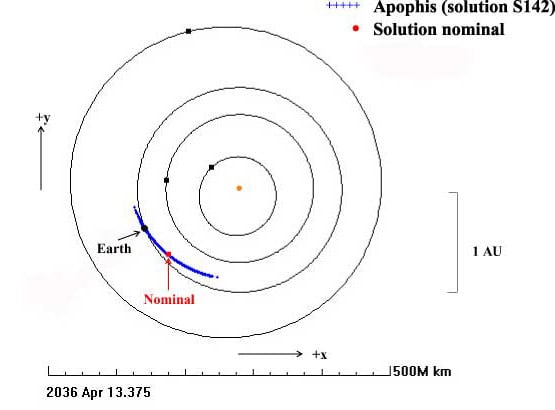[/caption] Russia is considering sending a spacecraft to deflect a large asteroid and prevent a possible collision with Earth, according to a radio interview by the head of the country's space agency. Anatoly Perminov said the space agency will hold a meeting soon to assess a mission to asteroid Apophis, and said NASA, ESA, the Chinese space agency and others would be invited to join the project. Apophis is a 270-meter (885-foot) asteroid that was spotted in 2004. It is projected to come within 29,450 kilometers (18,300 miles) of Earth in 2029, and currently has an estimated 1-in-250,000 chance of hitting Earth in 2036.
A panel at the recent American Geophysical Union conference stressed that asteroid deflection is a international issue.
"There is a geopolitical misconception that NASA is taking care of it," said former Apollo astronaut Rusty Schweickart, who is part of the B612 Foundation, which hopes to prove the technology to significantly alter the orbit of an asteroid by 2015. "They aren't and this is an international issue. The decisions have to be world decisions."
Perminov seemed unaware that NASA's Near Earth Object program recently downgraded the possibility of a 2036 asteroid impact and also for a subsequent pass in 2068.
Perminov said that he heard from a scientist that Apophis asteroid is getting closer and may hit the planet. "I don't remember exactly, but it seems to me it could hit the Earth by 2032," Perminov said. "People's lives are at stake. We should pay several hundred million dollars and build a system that would allow to prevent a collision, rather than sit and wait for it to happen and kill hundreds of thousands of people."
Perminov wouldn't disclose any details of the project, saying they still need to be worked out. But he said the mission wouldn't require any nuclear explosions.
"Calculations show that it's possible to create a special purpose spacecraft within the time we have, which would help avoid the collision without destroying it (the asteroid) and without detonating any nuclear charges," Perminov said. "The threat of collision can be averted."
Boris Shustov, the director of the Institute of Astronomy under the Russian Academy of Sciences, hailed Perminov's statement as a signal that officials had come to recognize the danger posed by asteroids like 2036 Apophis.
"Apophis is just a symbolic example, there are many other dangerous objects we know little about," he said, according to RIA Novosti news agency.
Sources: Associated Press/Yahoo News, AGU panel discussion
Here's some more information on the 2036 meteor.
 Universe Today
Universe Today
